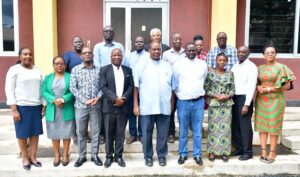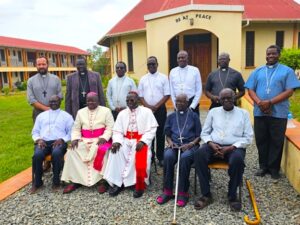UGANDA: Catholic Bishops warn against introduction of GMOs in the country

The Catholic Bishops in Uganda have warned the Government against the introduction of Genetically Modified Organisms (GMOs) and Genetically Engineered (GE) products into the country.
The bishops have protested against The National Bio-safety Act 2017 which Parliament approved into law last year, and is now waiting for the approval and signing by the President of Uganda.
They have said the text of the Act does not contain enough guaranties against the risks involved in the use of GE and of GMOs, particularly the dangerous and long-time negative effects for the health of people and animals as well as for the environment.
“The Act opens the doors for companies which will practically enslave the small scale farmers, creating dependence through exclusive use of their GMOs,” the bishops stated in a press statement that was released on 13th, June, 2018, and signed by the Chairman of Uganda Episcopal Conference and Archbishop of Gulu, Most Rev. John Baptist Odama.
“We are concerned for the health and life of our people and for protection of the environment in our country, the ‘home’ that God has given to His children in Uganda,” added the prelates.
If signed, the new law will allow and support the use of GMOs and GE products in Uganda. GMOs and GE are the outcome of the combination of the genes of two different and often unrelated species, in order to have a new organism or product. GE allows scientists to speed this process up by moving desired genes from one plant into another—or even from an animal to a plant or vice versa.
The church leaders argued that the prevailing model of industrial agriculture, heavily reliant on chemical fertilizers, pesticides, fossil fuels, and a seemingly limitless supply of cheap water, will contribute to the destruction of the natural biodiversity and enslave the small scale farmers.
The process of putting in place legislation to govern Biotechnology and the use of GMOs in Uganda started back in 2008. All along, together with other stakeholders, Caritas Uganda, which is a department of the Uganda Episcopal Conference has followed this process expressing the concern of the Church for the safety of human and animal life as well as for a healthy environment, in a bid to create awareness among legislators and the public in general about the risk implications of tampering with nature through an indiscriminate use of biotechnology and GMOs.
“In fact, it is no secret that, behind the appealing targets of quicker and bigger economic advantages through enhanced crops and food production, there are the huge risks of some big international companies that are more interested in their financial profit than in people’s health and life and in the safeguarding of our environment,” the prelates stated.
The bishops, therefore, are appealing to the authorities concerned to take one of the two legal options still open according to the Rules of procedure of Parliament before the Act is implement by either withdrawal of the Act (rule 139) to hold a more adequate consultation, or amendment of the Act (rule 142) recommended by the President.
Meanwhile, many African countries have banned GMOs crops, arguing that they will cross contaminate other plants, pollute the environment and could have long-term health effects for humans.
The United States, Brazil and India are the world’s largest growers of GM crops while in Africa, South Africa is the only country producing GM maize on a commercial scale.
∽End∽
By Jacinta W. Odongo, Media Officer, Uganda Episcopal Conference


